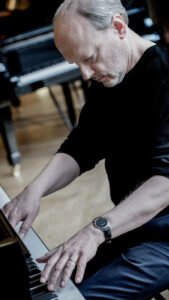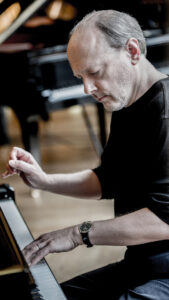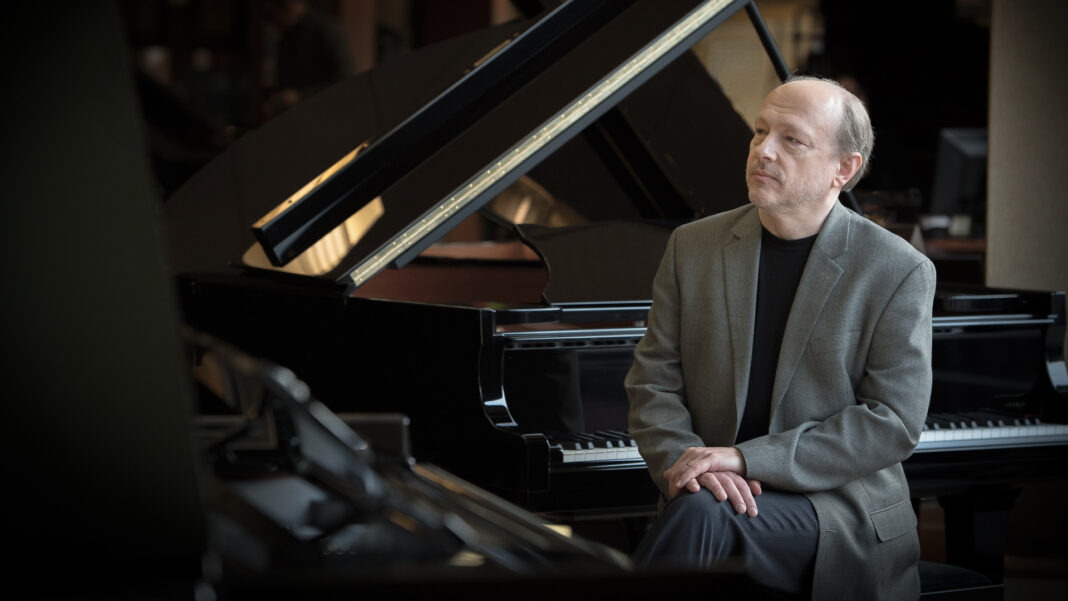
It’s a busy time for composer/pianist Marc-André Hamelin. On February 2nd his album New Piano Works was released. It was Hamelin’s first recording of his own compositions since 2010’s Études. Hyperion Records, his label, was acquired and the floodgates of his dozens of releases on Hyperion were suddenly available for streaming. It is, as Hamelin says, a veritable “treasure trove of recordings.”
This weekend he joins the Los Angeles Chamber Orchestra for performances on March 2nd at The Wallis in Beverly Hills and a March 3rd performance at Zipper Hall at the Colburn School in downtown Los Angeles. Hamelin will be performing Nadia Boulanger’s Three Pieces for Cello and Piano and César Franck’s Piano Quintet in F Minor.
I last spoke with Hamelin in 2019. His new album (one of my selections for New In Music This Week: February 2nd) was part of our conversation as were his concerts. It also served as an opportunity to see how his point-of-view may, or may not, have changed in that time.
What follows are excerpts from our conversation that have been edited for length and clarity. To watch the full interview, please go to our YouTube channel.
Q: You’re going to be playing two pieces in these concerts with the Los Angeles Chamber Orchestra. One of them is Franck’s Piano Quintet in F minor. That’s a work you recorded in 2016. How much does the personality and the musicianship of any given other four musicians make a difference in the end result of this, or any other piece of music that you’re performing?
It does. But the fun, I think, of getting with a new group that you haven’t played with before, is to just to discover each other’s musicianship and finding common ground. Also, suggesting differences and new ways of doing things that they might not have thought of. It’s an area that’s very, very rich in surprises and possibilities. That goes for any piece in the repertoire, really.
With all five musicians in a quintet, or four in a quartet, is there any place to hide?
Maybe small ones. But especially with a work that’s so well known as the Franck Quintet. It’s really one of the big five along with the Brahms, Schumann, Dvorak and Shostakovich. We hear it so often that people know how it goes, or at least most of them do. So, in that sense, there is little room to hide and for mistakes. In a lesser known work, belonging to the byways of the repertoire, then maybe, since the piece is not heard very often, perhaps it’s more acceptable to be faulty. It will matter a lot less, I guess. Of course, we always strive for as much perfection as possible. Or at least, fidelity to the composer’s thought.
Apropos of that statement, do you feel like works are museum pieces and should be slave to what the composer’s thoughts were? Or is there room for this music to live and breathe and have its own life in 2024 versus the life it had when it was composed?
There’s several ways of thinking about this. On one hand, being a composer myself, I don’t pretend to have all the answers. Nobody does. But being a composer allows you to feel a little closer to the works you perform and especially how they were created. Sometimes you can see the process. I have a pretty good idea of how I want my pieces to go, but there is so much you can do in the way of notation to convey that. You have to leave something to the performer’s individual views or ways of understanding musical notation.
On the other hand, there are several different types of composers. There are composers who will allow great variations of interpretation. For example, I can think of Grieg, who once said to someone this is not really the way I saw it, but don’t change anything, I love individuality. There are other composers who are thankful for any performance, even though it may fall short of their expectations. There’s lots of nuances within the individual composer’s appreciations and that’s what makes the whole world richer.
When we spoke five years ago, you mentioned that you, “Have the luxury, at this point in my career, to be playing, without exception, pieces that I really love.” How do you think your perspective on what those pieces are has shifted since then?
It’s pretty much the same, actually. I keep introducing favorites. Sometimes I come back to old ones because it’s always very healthy and also very fascinating to revisit things that you haven’t played for quite a few years. It’s always really startling. I see sometimes how much they have changed without you doing a single thing. In the meantime, you have changed yourself. Therefore, your approach has changed. When I play these pieces for myself, after not having played them for many, many years, they will be completely different. That’s only because of my personal evolution and, hopefully, my increased understanding of what the composer wants.
Do you find that there are pieces that intimidate you?
I’m a little less inclined – quite a bit less inclined – these days to play the big virtuosic things. I’m much more interested in meaningful communication at this point rather than showing myself off on stage. That, to me, is really not very satisfying. A recital is really a one-to-one act of communication. An offering, an act of sharing with the audience. I’m always thinking every single second of the audience, rather than myself. Because what else am I doing this for? I just really adore sharing discoveries and perhaps new ways of doing things that people already don’t.
Is there something that you think is pivotal to communicate to an audience now that perhaps reflects either who you are as a person right now or the times that we’re living in?
I really concentrate on the music. Generally a concert really should be, in the best of times, abstracted from whatever else is happening in the world. However, I will say this though. Maybe two or three days after the 2016 election I was giving an all-Mozart concert at the 92nd Street Y in New York. So many people at the end told me, thank you. We needed that. And I won’t say any more.
New Piano Works is your first album of material you’ve composed to be released since Études in 2010. Why this work and why now?
It’s really more for practical reasons than anything. I’ve been very fortunate in having been published by Edition Peters who are one of the major publishers. They originally solicited me, and the first thing they published with it was this volume of 12 études which I recorded along the same time. Since then I published a number of piano pieces which hadn’t been recorded. So it’s basically a collection of almost everything that I’ve written for piano since then.
It’s sort of a dull reason, but, I’ve really come to realize very quickly that even if you publish a score and make the music available, the music is going to be a lot more appreciated and more pianists are going to go to it if they can hear it first. That’s why I recorded these things.
The album opens with Variations on a Theme of Paganini, a piece most concertgoers or classical music fans have heard for years. How do you approach something that is as familiar as that for a transcription versus something that an audience may not know as well?
It was really a fun thing to do and I instinctively chose the theme simply because it’s one of those things which is easy to elaborate on. I mean, the structure is very simple. It’s very easy to remember and you can riff on it in just a gazillion different ways. A piece like that, for me, is an expression of freedom in a sense. I couldn’t resist having fun and quoting different composers. I’m sure you heard, variation seven I think it is, there’s a passage and one of the variations in the Beethoven Sonata, opus 109, it’s in E major. I transposed it to A minor and for 16 bars, it’s already a Paganini variation. I didn’t have to change anything. That was a lot of fun. When I came across this little bit I thought, I can’t not use this. This is too good. And it happens to be quite funny.
Do you, as a composer, have any conversations with you as a pianist in terms of what is truly possible to play versus what you want to express in the notes themselves?
At the beginning when I started to write, I just wrote whatever I wanted. Whatever I heard, without really too much concession to pianistic comfort. I was wondering why nobody was playing my things. Even I had trouble and I wrote them. So over the years, as I gained experience, I was able to make things sound the way I wanted without them being so difficult. But I’ll always carry that reputation of my things being almost unplayable. But I can assure you that there’s a lot that I wrote which is perfectly approachable.
Are there other ways in which you feel you have evolved as a composer?
I think that my harmonic system, such as it is, because I’ve never tried to explain it, really hasn’t changed that much. I think if anything has changed, I think I’ve gotten to think more about expressing pure music than thinking in pianistic terms.
Your Hyperion Recordings now available for streaming. Do you feel this new way of distributing music, however challenging it might be economically for a performing artists like yourself, balances out with this newfound exposure that people can suddenly have to countless recordings of yours?
I think exposure is really the priority here. We should be thankful for that. A lot of people, over the last few years, have complained to me, we can’t find you on Spotify. We can find your early recordings on other labels. Hyperion resisted for the longest time and purely for financial reasons. But now that they’ve been bought by a large corporation, the justification is there. I think people are just so pleased as punch that Hyperion is finally being heard. The catalog is a golden treasure trove of discoveries and wonderful performances.
What do you think the role is of a transcription in allowing listeners new ways of hearing works that they’re familiar with, or new ways of hearing music that they’re not familiar with, for that matter?

In many cases, it’s about expanding the repertoire. A lot of solo instrumentalists are envious of something like the Franck Violin Sonata and they want to play it. So there are arrangements for cello, for flute and other solo instruments as well. I’ve always been fascinated by composer’s views of other composers; appreciations of other composers. I think really a transcription is just another way of expressing that. It’s paying tribute, let’s say. You think of what Busoni did with the Bach Chaconne from the D minor Partita. He really built a wonderful cathedral of sound. There are some people who don’t like the transcription, but I personally view it as a tremendous act of reverence for a composer.
Amongst my favorite transcriptions are Liszt’s transcriptions of Wagner. I think those are really interesting because we’re so used to his big, huge orchestral arrangements. To have it pared down to one instrument, I find it endlessly fascinating and a different way of hearing Wagner.
The only ones that I’ve played are the Liebestod (from Tristan und Isolde) and also the Tannhauser Overture. But that particular one, I don’t like pianistically. It’s in E major and it feels, under the fingers, like completely the wrong key.
It’s interesting you say that because I spent a little bit of time over the years with Stephen Sondheim. He and I were talking once about The Ballad of Sweeney Todd. He said it’s published in F minor, but it sounds so much better in F-sharp minor. I went to my piano at home and played it. He was right. It’s shocking how even a half-step difference can have such profound effects on a piece of music.
Keys are a very important. They have personalities. They really do. Gerald Moore, the famous pianist, expresses that very, very eloquently. He guards against sometimes indulging transposition – a singer’s transposing. Because you can stray too far from the original mood of the song.
Liszt is quoted as having said, “My piano is to me what a ship is to the sailor. It is the intimate, personal depository of everything that’s stirred wildly in my brain during the most impassioned days of my youth. It was there that all my wishes, all my dreams, all my joys and all my sorrows lay.” What is your piano to you?
An extension of my thought. An instrument of communication and sharing and joy.
To watch the full interview with Marc-André Hamelin, please go here.
All photos of Marc-André Hamelin (Photo by Sim Cannety Clarke/Courtesy Colbert Artists Management)












